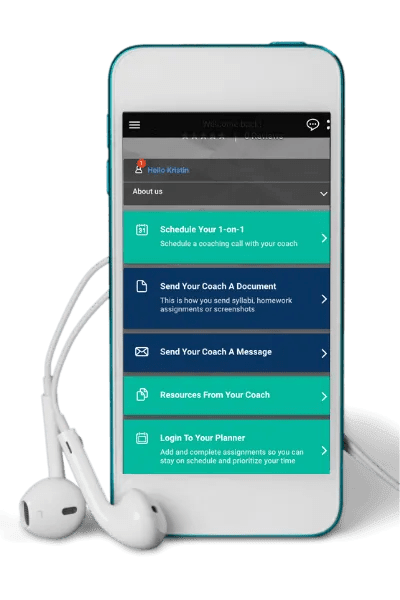Develop Your Executive Function Skills And Succeed in School with a Coach!
We all have weaknesses. Overcoming and/or learning to manage your weaknesses so you can improve your performance in school will give you valuable knowledge and habits that serve you for the rest of your life! A coach can help!

Connect with an Expert Who Can Help!
Do you want to learn more about your results? A Thrivister Program Director can help you work through the challenges you or your student are facing and help you decide if coaching can help them get back on track in school and life!
Here are three skills you struggle with and tactics to improve them
A coach can help you develop these skills

Planning & prioritizing
The ability to create a roadmap to reach a goal or to complete a task. It also involves being able to make decisions about what’s important to focus on and what’s not important.
Focus and attention
The capacity to maintain attention to a situation or task in spite of distractibility, fatigue, or boredom.
Task Completion
The ability to complete the tasks you set out to do.
Time management
The capacity to estimate how much time one has, how to allocate it, and how to stay within time limits and deadlines. It also involves a sense that time is important.
Working memory
The ability to hold information in memory while performing complex tasks. It incorporates the ability to draw on past learning or experience to apply to the situation at hand or to project into the future.
Organization
The ability to create and maintain systems to keep track of information or materials.
Task Initiation
The ability to begin projects without undue procrastination, in an efficient or timely fashion.
Follow through
The capacity to have a goal, follow through to the completion of the goal, and not be put off by or distracted by competing interests.
Emotional Regulation
The ability to manage emotions in order to achieve goals, complete tasks, or control and direct behavior.
Start Improving Right Away
Try these quick tactics for working on your three weakest executive function skills
A coach is the best way to stay accountable when improving these skills but knowing where to start and a few things you can work on now empowers you to start now!
Planning & Prioritizing
- ✓ Use a color-coded planner with check ins on progress and accountability
- ✓ Use a large whiteboard visual in plain view using color system for each category and update it at the same time each day
- ✓ Brain dump all of your to dos with a coach/mentor and use a numbering system to rank importance
- ✓ Use a Mind Map to brainstorm and connect thoughts
- ✓ Create routines - set times to dedicate for planning ie…Sunday evenings with an accountability partner who can check that it happened
Focus & Attention
- ✓ Use fidget toys or Chew Gum while doing a task
- ✓ Sip a drink while you work
- ✓ Use a rubber band on your wrist as a focus reminder
- ✓ Take notes to help focus and pay attention: even doodling helps! Use colorful pens.
- ✓ Customize your environment - remove distractions, noises, seating arrangement, listen to white noise, choose somewhere tidy
- ✓ Background music can help. Listen with headphones for less distraction.
- ✓ Think about your diet; choose high protein, cut down on sugar, watch your processed carb intake
- ✓ Vitamin supplements: Omega 3s, & herbal recommendations for mood/focus/stress
- ✓ Medication recommendations by physician
- ✓ Timed check-ins using technology and timers for reminders
- ✓ Meditation routines are proven to help focus and clarity. Try using a youtube meditation or an app like Calm
- ✓ Check-ins with a coach/mentor
- ✓ Create check lists with color coding
- ✓ 1-2-3-system for checking work against your rubric (once done, double check your work and compare it to the rubric)
- ✓ Use a timer, watch, egg timer, apps work great
- ✓ Pick the easiest task first to get momentum going
- ✓ Use the color-coding system to show completion and fuel motivation
- ✓ Have a small tangible reward for milestones of completion
- ✓ Change due dates to create a sense of urgency and kick the brain into fight or flight mode to help you get things done
Time Management
- ✓ Use self awareness techniques through powerful questioning to guide you in determining what each task/goal involves to complete.
- ✓ Record your estimates of time it takes and actual time in key areas of weakness and discuss with your Coach/mentor
- ✓ Use the planner set up with your coach to plug in start and stop times
- ✓ Factor in transitioning times when planning
- ✓ Create boundaries around commitments outside of academics: Are you a yes person to everyone? Prioritizing with your coach is key here
- ✓ Cross it off your list as it gets done to stay focused and in the flow of work
Working Memory
- ✓ Write it down!
- ✓ Use your planner and follow it
- ✓ Repeat it to yourself after you write it down
- ✓ Use technology to remind yourself
- ✓ Use visual cues to help your memory
- ✓ Use auditory techniques for creating a flow…..create songs in your head to remember sequences
- ✓ Repetition repetition repetition, create a routine or way of doing something, write it down to keep track
- ✓ Watch something to inspire organization like a new show - home edit 😉
- ✓ Visualize what it could look like: ie the study area, notebook, back pack…an appealing look will motivate you to stay more organized
- ✓ Use planners, color-coding, visual inspiration,
- ✓ Take a before and after picture (personal favorite)
- ✓ Set a specific time each day or week to organize and have a coach/mentor hold you accountable
- ✓ Start with something small and doable within a short amount of time (often feeds bigger accomplishments)
- ✓ Schedule time for organization in your planner
- ✓ Set a time that works with your biorhythm to get things done
- ✓ Choose and commit to what you are going to start with easiest vs hardest….voicing the commitment helps you stick to it
- ✓ Break things down into chunks and then schedule each chunk in your planner
- ✓ Create a false sense of urgency (change due dates)
Follow Through
- ✓ Use color coding system or check off list to show what is and isn’t done
- ✓ Write your tasks and obligations in a planner every morning
- ✓ Use a coach/mentor for accountability and clarifying action techniques
- ✓ Do the small and quick tasks first
- ✓ Set the intention for follow through with positive affirmations
- ✓ Discuss with a coach/mentor the benefits of what doing what you say….create trust, respect, integrity which makes you feel good.
- ✓ Set a time that works with your biorhythm to get things done
- ✓ Break things down into chunks so you don’t get overwhelmed
- ✓ Hold yourself to a sleep routine and document it to stay on track
- ✓ Use a countdown to react to stressful situations; practice it
- ✓ Use the box breathing method to de-escalate emotions
- ✓ Discuss key actions to take when feeling out of control and role play with your coach/mentor
- ✓ Work on doing one thing at a time and use the cross off method or color coding to pace it out
- ✓ Use meditation techniques
The Connection Between Strong Executive Functioning and Academic Performance
Executive function is a set of mental skills that include working memory, task Initiation, time-management, planning and prioritizing, task completion, organization, follow-through, attention and emotional regulation. All of these skills are necessary to study, follow directions, plan ahead and comprehend and retain new information. Without strong EFS we’re unable to learn and work efficiently.

Accountability is key!


You don't have to do this alone!
Academic Coaching Is The Perfect Step For You or Your Student!
Get Back On track! Create A Plan And Stick To It.
We use executive function skills every day to learn, work, and manage daily life. Develop habits and strategies to focus in school, cope with anxiety and overwhelm, and achieve and organize tasks and goals, among other things.
Click “Connect With A Coach” to talk with one of our Academic Success Coaches and learn more about getting your own Academic Coach so you can reach your goals this school year.
Practice Accountability
We're here to support you and teach you better habits, not shame you for going off track. Accountability helps you stick to the plan so you can achieve your goals!
Learn to SElf-Manage
Self discipline can be hard to practice, especially when you struggle with executive function. That's why working with the Thrivister Executive Function Coaches can help you learn to manage your productivity and focus more effectively.

Create New Habits
Struggling with positive habits is common when you struggle with executive function. However, with the right practices and coaching you can't create new and better habits that stick for life!
Succeed in school
We use executive function skills in school, in life and in our future careers. That's why working on them now will give you the tools to achieve endless successes throughout your entire life!

The Difference Between Coaching And Tutoring
Academic Coaching helps you stay on track towards your goals. Learn how to stay organized, focused, and in control of your academics.
Students often need tutors when they’ve fallen so far behind that they can’t catch up. An Executive Function Coach helps you develop better habits and skills so you can stop falling behind in the first place.
Your coach will help you develop healthy habits so you can grow to self-manage and stay on track. This is accomplished by establishing habit-building routines, coping strategies, and customizable accountability plans.
Click “Connect With A Coach” to talk with our team and discover if coaching is the right fit for you or your student!
